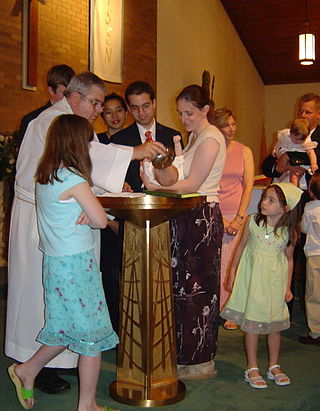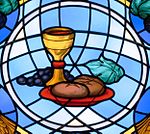
The Eucharist, also known as Holy Communion, Blessed Sacrament and the Lord's Supper, is a Christian rite that is considered a sacrament in most churches, and as an ordinance in others. Christians believe that the rite was instituted by Jesus at the Last Supper, the night before his crucifixion, giving his disciples bread and wine. Passages in the New Testament state that he commanded them to "do this in memory of me" while referring to the bread as "my body" and the cup of wine as "the blood of my covenant, which is poured out for many". According to the Synoptic Gospels this was at a Passover meal.

Infant baptism is the practice of baptizing infants or young children. Infant baptism is also called christening by some faith traditions.
Full communion is a communion or relationship of full agreement among different Christian denominations or Christian individuals that share certain essential principles of Christian theology. Views vary among denominations on exactly what constitutes full communion, but typically when two or more denominations are in full communion it enables services and celebrations, such as the Eucharist, to be shared among congregants or clergy of any of them with the full approval of each.

In Christian denominations that practice infant baptism, confirmation is seen as the sealing of the covenant created in baptism. Those being confirmed are known as confirmands. For adults, it is an affirmation of belief. It involves laying on of hands.
The Evangelical Lutheran Church in America (ELCA) is a mainline Protestant Lutheran church headquartered in Chicago, Illinois. The ELCA was officially formed on January 1, 1988, by the merging of three Lutheran church bodies. As of 2022, it has approximately 2.9 million baptized members in 8,640 congregations.

Closed communion is the practice of restricting the serving of the elements of Holy Communion to those who are members in good standing of a particular church, denomination, sect, or congregation. Though the meaning of the term varies slightly in different Christian theological traditions, it generally means that a church or denomination limits participation either to members of their own church, members of their own denomination, or members of some specific class. This restriction is based on various parameters, one of which is baptism. See also intercommunion.

Open communion is the practice of some Protestant Churches of allowing members and non-members to receive the Eucharist. Many but not all churches that practice open communion require that the person receiving communion be a baptized Christian, and other requirements may apply as well. In Methodism, open communion is referred to as the open table, meaning that all may approach the Communion table.
Christian liturgy is a pattern for worship used by a Christian congregation or denomination on a regular basis. The term liturgy comes from Greek and means "public work". Within Christianity, liturgies descending from the same region, denomination, or culture are described as ritual families.

First Communion is a ceremony in some Christian traditions during which a person of the church first receives the Eucharist. It is most common in many parts of the Latin Church tradition of the Catholic Church, Lutheran Church and Anglican Communion. In churches that celebrate a rite of First Communion separate from baptism or confirmation, it typically occurs between the ages of seven and thirteen, often acting as a rite of passage. In other denominations first communion ordinarily follows the reception of confirmation, which occurs at some point in adolescence or adulthood, while Eastern Orthodox and Oriental Orthodox Christians first receive the sacrament of Holy Communion in infancy, along with Holy Baptism and Chrismation.

Holy Communion, also known as the Eucharist and the Lord's Supper, is a Christian rite that is considered a sacrament in most churches. The elements of the rite are sacramental bread and wine.

Intinction is the Eucharistic practice of partly dipping the consecrated bread, or host, into the consecrated wine before consumption by the communicant.

Eucharistic discipline is the term applied to the regulations and practices associated with an individual preparing for the reception of the Eucharist. Different Christian traditions require varying degrees of preparation, which may include a period of fasting, prayer, repentance, and confession.

Eucharistic theology is a branch of Christian theology which treats doctrines concerning the Holy Eucharist, also commonly known as the Lord's Supper and Holy Communion. It exists exclusively in Christianity, as others generally do not contain a Eucharistic ceremony.
In keeping with its prevailing self-identity as a via media or "middle path" of Western Christianity, Anglican sacramental theology expresses elements in keeping with its status as a church in the catholic tradition and a church of the Reformation. With respect to sacramental theology the Catholic tradition is perhaps most strongly asserted in the importance Anglicanism places on the sacraments as a means of grace, sanctification and forgiveness as expressed in the church's liturgy.

The sacrament of holy orders in the Catholic Church includes three orders: bishops, priests, and deacons, in decreasing order of rank, collectively comprising the clergy. In the phrase "holy orders", the word "holy" means "set apart for a sacred purpose". The word "order" designates an established civil body or corporation with a hierarchy, and ordination means legal incorporation into an order. In context, therefore, a group with a hierarchical structure that is set apart for ministry in the Church.
In Lutheranism, the Eucharist refers to the liturgical commemoration of the Last Supper. Lutherans believe in the real presence of Christ in the Eucharist, affirming the doctrine of sacramental union, "in which the body and blood of Christ are truly and substantially present, offered, and received with the bread and wine."

Confirmation in the Lutheran Church is a public profession of faith prepared for by long and careful instruction. In English, it may also be referred to as "affirmation of baptism", and is a mature and public reaffirmation of the faith which "marks the completion of the congregation's program of confirmation ministry".
The Lutheran sacraments are "sacred acts of divine institution". They are also defined as “an outward and visible sign of an inward and spiritual grace.”.

There are seven sacraments of the Catholic Church, which according to Catholic theology were instituted by Jesus Christ and entrusted to the Church. Sacraments are visible rites seen as signs and efficacious channels of the grace of God to all those who receive them with the proper disposition.

A sacrament is a Christian rite that is recognized as being particularly important and significant. There are various views on the existence, number and meaning of such rites. Many Christians consider the sacraments to be a visible symbol of the reality of God, as well as a channel for God's grace. Many denominations, including the Roman Catholic, Lutheran, Presbyterian, Anglican, Methodist, and Reformed, hold to the definition of sacrament formulated by Augustine of Hippo: an outward sign of an inward grace, that has been instituted by Jesus Christ. Sacraments signify God's grace in a way that is outwardly observable to the participant.







